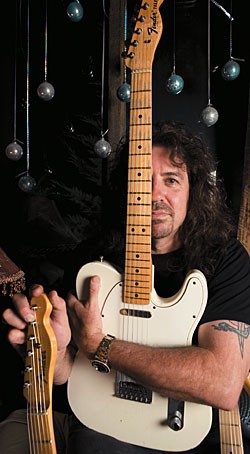
Photo: Rusty Russell.
Jason and The Scorchers hit the stage with bombast, conveyed true rock-and-roll punch in the studio, and was massively influential. But it never attained superstardom.
The band’s post-/neo-rockabilly style was dubbed things like “cowpunk” “country punk,” “punkabilly,” and “alt country.” And despite receiving huge props from critics, Top 25 album sales, videos on MTV, and a devoted following, JATS was never awarded its stripes. After being dropped by its record label in 1987, original bassist Jeff Johnson quit and the band took two years to release another album. Then, when 1989’s Thunder and Fire didn’t take off and drummer Perry Baggs was subsequently diagnosed with diabetes, guitarist Warner Hodges decided he’d had enough of fighting fate.
Strange things, though, musical trends; the advent of alternative rock epitomized by Nirvana had a sweeping effect. Next thing you knew, bands like Uncle Tupelo and Wilco were in fashion and carrying the “alt country” flag. By 1993, Johnson wanted back in. It took some doing, but he convinced Jason and the Scorchers to reunite – Hodges being the primary sticking point. But with Johnson and Baggs being every bit as into their newfound sobriety as Hodges was, he decided to go for it, especially since Johnson was proposing only a brief tour – two weeks, sticking close to home and playing friendly haunts. They rehearsed and rolled – and reaction from fans knocked the band on its collective ass. Two weeks, hell!
Two years later, the band released A Blazing Grace to a strong reception from fans and critics, and toured yet again. They followed with Clear Impetuous Morning in ’96 and the live Midnight Roads and Stages Seen in ’98.
In the years since, the band has seen ups and downs. Baggs passed away in July of 2012 after dealing with kidney disease. But Ringenberg and Hodges are still performing and recording, their work dwelling in quite different worlds.
In September of ’08, the Americana Music Association honored JATS with its Lifetime Achievement in Performance Award. Calling the band “musical pioneers,” the AMA noted “generation after generation have fallen under this sing-songy definition of success in one way or another. But Jason and the Scorchers embodied all three prongs of the hypothesis. They were punk. They were country. They were rock… most of all, they were originals.”
Indeed. Music in the early ’80s was more than just “country” or “rock.” There was “new wave” and “pop punk” and “hard rock” and “NWOBHM.” But JATS drew no such lines. With stylistic roots in country and a mindset to rock, the band offered audiences songs that were equal parts Faron Young and AC/DC, delivered with an over-the-top physicality epitomized by Ringenberg’s seizure-like stage moves and Hodges’ guitar-flailing spins and jumps that would’ve left C.C. Deville and Steve Vai neon green with envy – except maybe on those occassions where he bloodied himself by bashing his face into a mic stand or breaking a tuning key off his guitar – which he did while maintaining a rep for not missing a note!
Jason and the Scorchers wound up in Nashville via different roads; Ringenberg was an Illinois transplant who brought a cowboy hat and twangy voice to the bright lights of Music City. The Scorchers were local boys looking to play most anything but country.
Hodges, the son of accomplished professional musicians who for years toured with USO bands in England, Germany, and the U.S., grew up immersed in the 1950s/’60s “cry in your beer” country that was his parents’ specialty. His first instrument was drums because, “Every kid is interested in pounding on stuff like a drum kit!” His father, Ed, played guitar, his mother, Blanche, was the primary singer, and they introduced Warner to the potent effect of playing onstage.
“The first time I played was when we lived in Germany in the late ’60s,” he said. “I was 10, and their drummer didn’t show for a gig. Dad told me to load my stuff.”
The stage being literally set, he instantly became hooked on performing, even if being behind a drum kit lost its appeal…
What changed your view about drumming?
Watching Angus Young at my first AC/DC concert, going back and forth onstage. It was like “Lord have mercy! I want in on that,” you know? Three chords and a cloud of dust! It was my “My God!” moment. I didn’t want to be stuck on the drum stool.
Who was at that show with you?
It was Jeff Johnson and I – we were kids. My dad dropped us off.
You weren’t even old enough to drive?
Hell, no (laughs)! And when I started talking about playing guitar, my parents bought a ’62 Fender Jazzmaster from a guy who used it for a bit then put it in a closet.
How did you learn to play guitar once the decision was made to grab it?
Well, I was very fortunate my dad played and very fortunate my parents made me aware of all the great country music and ’50s rock. My older brother one Christmas got me Are You Experienced, Led Zeppelin’s first album, and Black Sabbath’s first album!
What does your dad think of AC/DC and the other rock music that influenced you?
Oh, he loves that stuff! Dad turned me on to Keith [Richards] and Woody (Ron Wood). It was like, “If you’re gonna do this, you gotta do it right. You gotta listen to these guys.”
My parents were always cool. In my dad’s mind, there’s no such thing as “country” or “rock” music or whatever. There’s good music and bad music. If it’s played well, he don’t give a damn. He thinks Parliament Funkadelic is cool as hell.
Which other guitarists influenced you?
Well, when I was a kid I had country music jammed down my throat to the point of not really digging it. But if I have a style, it’s because of my parents; because I learned so much country stuff first. Hell, I ran around with 900 songs in my head, because that’s what they did. But later, some of the first licks I learned were from Kiss songs. Then, Jeff and I were huge Cheap Trick fans, and that’s still one of my favorite bands. I listened to everything, and being in Nashville, we listened to Albert Lee and James Burton and the country/Tele superpicker stuff – musician’s musicians. There’s no way to live [in Nashville] and avoid being influenced by that.
A year or two ago, I went to a guitar clinic here given by Albert Lee, and it was absolutely one of the most frightening things I’ve ever seen! Three hundred guitar players sitting there going, “Welllll, looks like I gotta get a job.” Amazing (laughs)! My buddy Dan Baird (of Georgia Satellites fame) always jokes about how he’s the 463rd best guitar player in Nashville (laughs)!
Do you remember the first time you played guitar in front of an audience?
Well, I started playing lead guitar in my parents’ band. I’d be the bass player, the drummer, the guitar player, whatever we needed.
How about with people other than your parents?
Perry, Jeff, and I did some really crappy “battle of the bands” stuff and that kind of junk. There was a little punk-rock club here called Frankenstein’s, it was the first punk club I know of in Nashville. It’s where we found out about The Clash and the Sex Pistols and all that stuff. This was ’76 or ’77. It only lasted two or three years. But that was where we learned to perform in front of people.
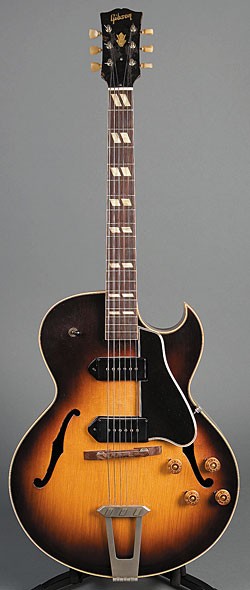
1953 Gibson ES-175D, bought new by Hodges’ father and used a lot on the Dan Baird and Homemade Sin record, strung with a wound G. “Danny did a lot better job with it than I did,” Hodges laughs. “But then he uses barbed wire for strings!” Photos Rusty Russell.
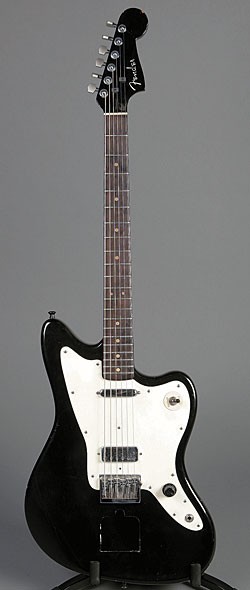
Hodges’ prized ’64 Fender Jazzmaster. “I was given this guitar when I started playing by my parents,” he said. “I got it and a Vox Berkley 2 Beatle amp. I was 10 years old.” It has long been his primary recording guitar, including the early JATS albums. “It has a sound all its own and has never let me down.”
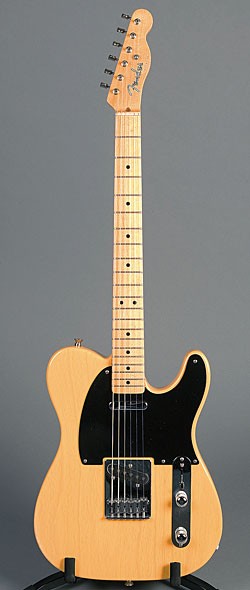
This Fender ’52 reissue Telecaster has been around since JATS got back together in ’92. “A great guitar I bought very cheaply from Corner music in Nashvegas,” says Hodges, “It had feel straight off the wall, sounds great, and will not go out of tune.”
What was the band called?
The Electric Boys, and later, The Purple Giraffes. The Electric Boys – it’s kinda funny to think about it now, but that band was Green Day 20 years before Green Day; real fast chord progressions, but melodic. Had we come along 20 years later, we would’ve been onto somethin’ (laughs)! The Purple Giraffes was more just crazy, whacked out stuff – Generation X/Billy Idol, more obscure punk. But we also did original songs written by a buddy named Tom Littlefield, who is still a songwriter around town. He’s Woody Herman’s grandson and was writing songs at 15 or 16 years old – pop-driven melodies that sounded like Cheap Trick. Great songs.
Where were you at this point in terms of developing your stage presence?
Well, I was the singer in The Electric Boys. Jeff was the lead guitar player, and Perry was playing drums or bass – whatever we needed. Perry can pick up and play anything that makes music.
So you had to be near the mic most of the time…
Which was okay.
Do you have a “main” guitar?
Sure, the ’62 Fender Jazzmaster my parents got for me. Through the years it has had every pickup known to man – I mean every pickup. It’s been routed out so much that it actually changed the tone – in a good way. And I had it refinished one time, at Gruhn’s. It’s one of the loudest solidbody guitars I’ve ever heard without an amp. Seriously. I’m looking at it hanging on the wall and thinking of Nigel Tufnel – I can practically hear it resonating (laughs)!
What pickups are in it right now?
In the lead position it’s got a ’71 Firebird pickup that Seymour Duncan gave my old guitar tech in the Scorchers, and a Tele pickup in the rhythm position.
Is it still wired like the Jazzmaster?
Hell no! It’s wired like a Tele, man! Volume pot, jack, three-way switch…
What other guitars do you play most often?
Well, I’m a Tele guy. I’ve had three or four Strat phases – I’ve still got a great Strat. But I always find myself saying, “I can do damn near anything with a Telecaster,” you know? I’ve got three that I take literally everywhere with me – a Relic that cost an obscene amount of money. But my god, it’s an amazing guitar. I’ve also got a Strat, an SG, a Junior, and a ’53 Gibson ES-175D.
How about amps? What setup have you been using?
Well, I really started changing the amp thing about three years ago. I had always used big, loud amps – Marshalls, Hiwatts. Then I went completely the other way, approaching the small-amp thing. But now I’m using mostly a Fender ’57 Deluxe reissue and a 40-watt Blues Deluxe. I also use combinations of two Fender Pro Juniors through a Pro Junior with a Blues Deluxe, depending on the volume I need. That said, on the Homemade Sin record I used a 100-watt Marshall with a 4×12 (laughs)! Jeff Bakos in Atlanta turned Dan and me on to Hellatone speakers, made by Celestion. They’re broken in when you get ’em, and they eat Greenbacks for breakfast! Dan and I are truly impressed.
Talk about the first time you hooked up with the Scorchers.
After The Electric Boys just sort of imploded, there was about a year where Perry, Jeff, and I weren’t playing together. I was playing with this other group called The Press – a new-wave thing, like the Cars. A little bit more song-driven, a little bit less racket. Anyway, I ran into Jeff, who’d gone to an R.E.M. show Jason opened. He told me, “You gotta go see this guy.” So I went to see Jason, and he opened for Carl Perkins – his first two gigs in Nashville were with R.E.M. and Carl Perkins – and he was just astounding. I don’t think he was onstage 30 seconds – he was in the audience all night long. And I was thinking, “This is really cool,” and knew I had to hook up. Jeff had been trying to finagle his way into Jason’s guitarist spot. His bass player was Jack Emerson, who eventually became our manager. The drummer was Barry Felts, an old buddy from Frankenstein’s.
Long story short, Jeff ended up moving to bass with Jason, and brought me in because they needed a guitar player. I brought in Perry because we needed a drummer, and the rest is history. It all happened over a period of about three months.
And did everybody have the same objective?
Yeah, we were in it to get a record deal. That was the golden ring in those days. It took a couple years, but then Jack started Praxis Records. He had his hand on damn near everything that happened here for 15 years; he’s a very influential guy. If you were playing rock music in Nashville, you had to have Jack in your camp.
And eventually you signed with EMI…
It’s a funny thing – we were passed up by EMI seven times before they signed us. We had us a nice little file of rejection notices. But we just kept loading Jason’s little van, going out, and playing.
The first two records were EPs.
Yeah, Reckless Country Soul was a EP on Jack’s label, and simply put out so we could play a show in a big club. You had to have a record to get a gig (laughs). The second, Fervor, was where we were at the time. When EMI signed us, we had just put that out on Praxis, and added “Sweet Marie” to it, doctored it up, remixed it, and reissued it. It won EP of the year in the New York Times two years – as an independent and the next year for major-label EP. It was a good little record.
But things started really happening with Lost & Found?
Oh, and at that point we were gonna be the next Beatles! The first two years, the songs you hear on Reckless Country Soul, most of Fervor, and most of what become Lost & Found was our live show – we played that stuff every night. Lost & Found was a really good record, but it also helped create our sophomore jinx. We had been performing most of that stuff for a couple of years. So when we walked in, the songs were there. Still Standing was the record where we realized we needed to have songs.
You felt the pressure?
Yeah. And we’d been touring like crazy and there were a lot of negative things starting to happen – alcohol and way too much touring – no time to recuperate, and no time woodshedding. Our off time was spent doing another record. We bought into some of the hype and were too stupid to understand how things really worked.
Lost & Found was very well-received, critically amd commercially. And you followed with Still Standing. Thoughts on that album, looking back?
My problem with Still Standing was that the reverbs had reverbs! But some of the songs were very good; “My Heart Still Stands With You” is one of my favorites. The live version sounds a million times better. But it was a lesson learned the hard way, and I never again recorded the same way.
What do you remember about making Thunder and Fire and that time in the band’s history?
Well, the big problem with Thunder and Fire was the day the record was released, we were dropped. We worked our rear ends off putting that record together – I never worked so hard for so little.
You got no push whatsoever in terms of publicity?
Nope, nothing. We spent a small fortune making it, and a lot of time and effort. And when the label dropped us, I went off the deep end. How many times can your crawl in the ring and fight Mike Tyson before you just don’t want to fight any more, you know? You win, I lose! I quit playing for three years. It was the most frustrating time of my musical career, for sure.
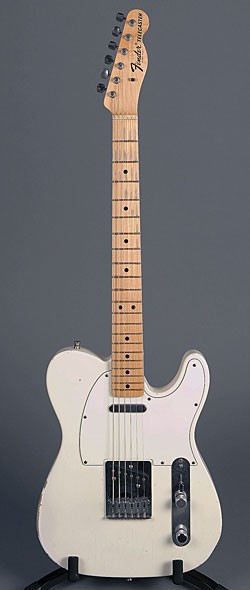
This Fender Telecaster Relic is Hodges’ primary live guitar. “I thought Relics were B.S. until I picked this one up and played it. It weighs nothing.” Photos Rusty Russell.
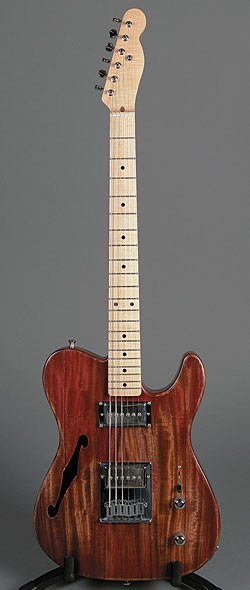
Hodges calls this guitar, “My attempt to get a Les Paul Special P-90 tone. A damn nice parts guitar, it’s a chambered Warmouth mahogany body with the fattest maple neck I could get from Warmouth. It has a big, meaty P-90 sound and I used it on about three-quarters of the Homemade Sin CD.”
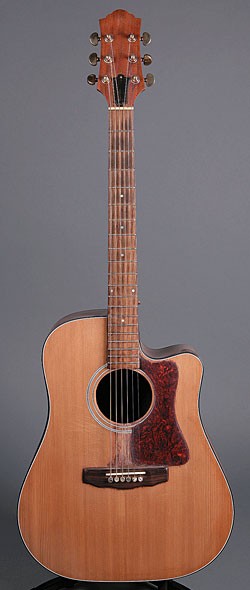
7) Guild acoustic given to Hodges by Dave Roe, longtime bass player for Johnny Cash. “Every time I picked up this guitar, we came up with a song,” Hodges recalled. “I guess it’s kinda like me – a little worn, but it stays after it in a very good way.”
What did you do with yourself?
Basically, I drank way too much, to be dead-up honest. I just went off the deep end. I don’t know how else to describe it. It was like all of my dreams had come crashing down around me.
Despite the fact Jason and the Scorchers had songs on the radio and the “Absolutely Sweet Marie” video was on MTV, what kept you from becoming superstars?
I think we were way ahead of our time. The reason I always heard, that I actually understand, was that we were too country for rock radio and too rock for country radio. Once we got to A&M we realized how good a job EMI had done with us – I believe they did everything they knew how to do with us. But there was just really no place to put us. They tried very hard in Europe, and we still play there as a result. But what we were doing was just not being done back then. Now, I think we’d be pushed as a straight country act.
But what is country music these days?
Thank you very much! Everything’s “Americana…” You’re rap, you’re classic rock, or you’re Americana.
When the Scorchers started, there was no such thing as a distorted guitar on a country song. Turn on a country radio station now, it mostly sounds like bad Lynyrd Skynyrd. But when we started, country radio was about Lee Greenwood and Vegas-like country… Barbara Mandrell… Vegas Elvis country music. We wanted nothing to do with that type of music or the music establishment – and it didn’t want a damn thing to do with us! But, once the New York Times and the London Times decided we were cool, then everybody dug us.
JATS re-formed in ’93, and you were the last guy to sign on. Why were you so reluctant?
I’d sobered up and was terrified to go back out and play clubs. I was trying to get my life back together and didn’t trust myself to be in clubs. Plus, I found it hugely ironic that the thing I blamed for all my problems – the music business – was gonna help the Phoenix rise from the ashes. But it did… and I still ain’t had a drink in almost 16 years.
Why were you so skeptical?
I didn’t think anybody cared. I’d worked so hard putting the Thunder and Fire band together, but we never even got it out there for people to hear. We did a few shows, but not many. And I really wasn’t interested in sobering up. The only thing I knew was how to make racket with a guitar, chase women, and drink beer. In my head, all of it went together. And for the first couple of years after the Scorchers started playing again, I would literally walk into the club when it was time to play and walk right off the stage and get in my car and leave. I didn’t spend one minute in the bar that I didn’t have to.
What was the plan with the reunion?
Jeff wanted to do a 20-date reunion tour over 25 or 26 days, then go our separate ways. There was a front and back to it. And we didn’t want to play Nashville, just in case it sucked. Personally, I signed on for the money. But by day 10 everybody started getting into it and we were having a great time. It was like, “I wish we were doing more shows!” Then we decided we needed a record and all of the fabulous stuff that goes along with it (laughs)!
What do you remember about the first reunion gig?
Well, we planned to rehearse for a week, but Jeff’s mother passed away right before, so we ended up only rehearsing twice – we hadn’t hit a lick with Jeff in five or six years… I hadn’t played in three. And the first rehearsal was absolutely godawful. I mean terrible! We talked about canceling the tour, it was so bad. But at the second rehearsal, things came together. And fortunately, our first gig was in Bloomington, Illinois – a small place. It was like a dress rehearsal, and I don’t know if it was egos or what, but we walked out to, “Ladies and Gentlemen, Jason and the Scorchers” and it was like someone flipped a switch – like we’d never stopped playing together.
Adrenaline rush?
Yeah, that was a biggie. The next night, we played in Chicago, and I remember the promoter, backstage before the show, telling us he thought he’d been sold a bill of goods because our contract rider for that tour said the dressing room had to be cleared of alcohol. He’d been told Jason and the Scorchers drank like fish!
So the rest of the band was approaching sobriety the same way?
Oh, yeah. Well, Jason never had a drinking problem.
And after Chicago…
It just rolled on. I remember the fifth show was Atlanta. The girl I ended up marrying was at that show. And that was also the night that I realized, “Damn! I’m a guitar player. I have got to be doing this!”
And plans changed so the band would keep going?
Oh, yeah! Jeff was going to get more gigs and we were gonna record. On whose Fostex machine? I don’t know (laughs)! And with what money (more laughs)? But we’ve got some friends here who owned the Castle Recording Studio here in Nashville and the manager/house engineer at the time was Mike Janas, and he cut a deal with the owner, so when place was empty we could use it to record for free. We just had to buy tape. And we worked out a little deal to pay Mike – but he might have made a buck an hour. And we recorded A Blazing Grace here and there over the course of four or five months.
Did you enjoy the process?
I had just sobered up and I didn’t know if the thing sounded good, bad, what, you know? It was a very difficult record for me, so it was never one of my favorites. I didn’t like the way we did it – there was no cohesion. We’d do two days here, three days there. But it got the band back on track.
After A Blazing Grace, we got to really play again. It felt like Jason and the Scorchers – playing dates, working, and having a great time. I got a little sober time under my belt, and I didn’t feel near the trepidation being around the music business, which had become a lot more people-friendly and roots-oriented. I liked the way our new label, Mammoth, was doing things. We were never asked to do stupid stuff, and they didn’t expect us to sell Led Zeppelin-like numbers. They simply gave us a place to make Jason and the Scorchers records, which is all we were looking for.
In ’96 you recorded Clear Impetuous Morning, which was also very well-received. How do you feel about that album, in retrospect?
That is one of my faves! When we did Clear Impetuous Morning, we had a batch of 17 or 18 good songs. We went down and did it in this little studio we were turned onto by Jeff Bakos down in Atlanta. We were very comfortable recording there. Jeff’s still a good friend!
Is there talk of a new JATS studio album?
There is. But it would be different; Jeff left the band because he just didn’t want to do it anymore. Perry needs a kidney transplant, he’s very ill and simply can’t tour, so we’ve quit doing Jason and the Scorchers shows. The last five years, I think we’ve done four shows, and two were benefits – one for Jack Emerson’s widow after he passed away, and one for Perry. He’d been in the hospital for half a year and had no insurance at the time. He can be involved if we record in Nashville. Even if he can’t play drums, he can write and he can sing.
On our European dates we’ve had Pontus Snibb playing drums. He fronts his own band in Sweden, and is basically a guitar player/singer who can play the hell out of the drums. It’s almost like having Perry back there; Perry’s not really a keyboard player and a guitar player, but he could play drums like any punk-rock drummer would get after it, but with a great sense of musicality. Fenner Castner has been our drummer in the States for the last few years.
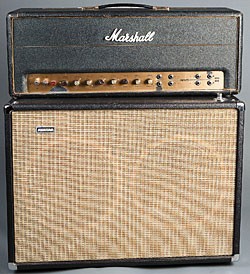
Marshall 100-watt PA head belonging to Dan Baird. “I used this or a 100-watt Hiwatt on the Homemade Sin CD,” says Hodges. “This amp and I kinda went together very well. The only knob I ever touched was the Volume knob – it went up for more gain or down for less, and did the deed very well!” Photos Rusty Russell.
Talk about your gig with blues singer/harmonica player Stacie Collins.
It’s like a blues version of the Scorchers. My buddy Ken McMahon used to play in her band, and about three years ago his wife had a baby. So I offered to cover two gigs for him – and I’m still there!
I dig it because I get to play blues. It’s still a little bit of a country-rock thing, but touches more blues. I’d never been down that road. And she’s a harmonica-playing fool – she can flat-out get after it! Dan produced her first record, and that’s how he and I reconnected. One thing led to another, and we fell into the Homemade Sin thing.
And then there’s your gig in Dan Baird’s band, Homemade Sin. Who else is in that?
It’s Dan, Keith Christopher on bass, Mauro Magellan, who was also the drummer in the Georgia Satellites, and I. And it’s a s**t-hot rock and roll band!
When did you guys fire it up, and what was the premise?
Well, I went to Europe late last summer to do one Jason and The Scorchers show, and with the help of a fan named Mark Cunningham added 15 solo shows to showcase a record I’d just finished. I wish I had 500,000 more fans just like him. Anyway, Dan’s band had a tour scheduled and their guitar player bailed on them at the last minute. So I covered those shows, and one thing led to another. They were planning on breaking up after those shows, but we come home and instead wrote and recorded an album. It was really cool. They’re all incredible players. I fight like hell to keep up! It’s a load of fun.
When did you find time to do a solo record, and what’s it about?
The solo record is basically a Jason and the Scorchers record without Jason. About a year and a half ago I was approached by Mark Cunningham who wanted to know why I hadn’t been to Britain in so long – it had been nine years since the Scorchers had been over. I jokingly replied, saying “Book some shows for me and I’ll come play them.” Well, he did (laughs)! So we worked it out, went over and did the shows, and I just started thinking before I went, we’re gonna need songs. So I did a record. I just called on a bunch of friends and did it in three or four days. I was working on a record before that, but only had five or six songs. So I added a few covers and put it out there. It’s a rockin’ record – relies way more on solos than songs.
Warner Hodges’ Mix for the JATS Newbie
For the uninitiated, the man responsible for Jason and the Scorchers’ gutpunchin’ guitar offers a 16-track mix of suggested cuts to prime yer’ pump. Call it his personal “best of” collection.
“Most people think I’m Mr. Balls-Out Guitar – they think Jason is the country-folk side of the band and I’m the loud punk rock guy,” he says of his selections. “And I do love the loud stuff. But nine times out of 10 when Jason asks what I want to play at a gig, I answer with some form of country song. And these are not all about super-hot guitar solos,” he adds. “But they’re good songs… which is a good thing.”
“Absolutely Sweet Marie” (Fervor, 1983)– “This is the song that got us noticed in 1983-’84. This was our first MTV video, and it got some radio airplay. We did a fine job with this because Bob Dylan has told us we did a fine job! I don’t know if we need any more validation.”
“Broken Whiskey Glass” (Reckless Country Soul, 1982, and Lost & Found, 1985) – “First truly original song for JATS as a band with Jason, Perry Baggs, Jeff Johnson, and myself. It epitomizes what we were always after in music. There is calm before the storm, then intensity with melody.”
“Still Tied” (Lost & Found)/ “Pray For Me Momma, I’m a Gypsy Now” (Fervor) – “Most people don’t know I was raised on a strict diet of 1950s and ’60s true country music. I love when JATS goes after a country song in the tradition of the music my mom and dad taught me to play as a kid. I never realized as a teenager the advantage I had over all of my musical friends because of my upbringing.”
“Kingdom For a Car” (Thunder & Fire, 1989) – “Guitar-wise, it’s not really a great Scorcher song, but it’s got a really nice solo.”
“Crashin’ Down” (Still Standing, 1986) – “Probably the single best electric guitar part I ever put together, front to back.”
“Harvest Moon” (Fervor) – “Love it so much I re-recorded it on my solo record.”
“White Lies” (Lost & Found) – “Scorchers fans love it, and it is a good radio song. One of those I think I’ve played a thousand too many times!”
“When The Angels Cry” (Thunder & Fire) – “The solo and outro are fun, fun, fun. It was much easier live with Andy York in the band, but pulling this song off live in a three-piece is very rewarding – or very humbling, depending on how I deliver it on a particular night.”
“Walking A Vanishing Line” (Clear Impetuous Morning, 1996) – “Kind of obscure, but I love that song.”
“Walking The Dog” (Midnight Roads and Stages Seen, 1998) – “Cool because it features my folks. Not all kids get to play with their parents in a band. I really cherish the times it happens, especially since it’s less frequently now.”
“Cry By Night Operator” (A Blazing Grace, 1995) – “A good rock and roll song.”
“My Heart Still Stands With You” (Still Standing) – “I love the song, but hate the production.”
“Jimmy Rodgers’ Last Blue Yodel” (Reckless Country Soul) – “We got to go all the way back to the punk rock, man!”
“Last Time Around” (Lost and Found) – “The outro solo is a fun back-and-forth pickup-change solo. Fun as hell live!”
“Somewhere Within” (A Blazing Grace, 1995) -“This song has more meaning now with Perry’s physical troubles. I always loved playing the solo with him. It would get down to he and I, and always reminded me of better times when we were really young, just jammin’ in my parents’ basement.”

“Toughest Tele I own,” Hodges says of this guitar, which on one day in ’96 was run over by an airline luggage tractor then, after a strap lock broke during one of Hodges’ trademark over-the-shoulder guitar slings at the gig that night, sailed 19 rows into the audience. Retrieved by the band’s tour manager, he tuned its B string and went back to work.”These days, it’s Dan Baird’s spare if his Esquire is out of commission.” Photos Rusty Russell.
Warner Hodges’ 5 reasons the Tele kicks ass
1) You can play things behind the nut. You gotta love that!
2) It doesn’t matter what gauge of strings you use, you cannot mess up the neck.
3) You can drop it, kick it, pick it up, and it’ll stay in tune. One night in Norway, I threw one 19 rows deep into the audience, and a girl brought it back. The B string was sharp – that was it! That same guitar, in a case – not a flight case – was run over by a luggage tractor and six carts full of luggage. I went to the Scandinavian Air Service baggage claim to open the case – I told the lady, “I want you to see the damage at the same time I do.” I was so pissed off! But I opened the case and there wasn’t a damn thing wrong with the guitar. The case was destroyed, but the guitar was fine. That’s a Telecaster.
4) James Burton. I got a buddy who met Elvis. He asked, “Hey, Elvis… Where’s James?”
5) You can play any musical style with a Telecaster. It’s the Bayer aspirin of guitars. Crazy, how Leo got it right the very first time!
To catch up and keep with Warner Hodges, see his page on Facebook.
This article originally appeared in VG‘s November 2008 issue and has been edited since first appearing online. All copyrights are by the author and Vintage Guitar magazine. Unauthorized replication or use is strictly prohibited.
Watch this video in a new windowJASON & THE SCORCHERS (Warner E. Hodges) 2009- “Fortunate Son” (by John Fogerty) LIVE



